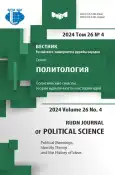Linguistic Contextualism of the Cambridge School: The Problem of the Idea as Historical Action
- Authors: Khudaybergenov G.R.1
-
Affiliations:
- Lomonosov Moscow State University
- Issue: Vol 26, No 4 (2024): Political Meanings, Identity Theory and the History of Ideas
- Pages: 709-719
- Section: FROM THE HISTORY OF IDEAS
- URL: https://journal-vniispk.ru/2313-1438/article/view/322403
- DOI: https://doi.org/10.22363/2313-1438-2024-26-4-709-719
- EDN: https://elibrary.ru/XXHRAF
- ID: 322403
Cite item
Full Text
Abstract
This study critically analyses The Cambridge School’s linguistic contextualism, focusing on the work of John Pocock and Quentin Skinner, in order to identify the limitations of this approach to the writing of intellectual history. The author questions the primacy of linguistic context in text interpretation postulated by The Cambridge School, suggesting that the movement of ideas should be seen not only as an integral part of the speech acts that generate them, but also as determined primarily by social conditions. The article discusses in detail the main provisions of linguistic contextualism: the concept of discourse as a system of linguistic conventions that define the boundaries of possible utterance; the role of speech act as an instrument of discourse change and political action; and the significance of authorial intention in text interpretation. By analysing the key works of Pocock and Skinner, the author identifies a number of problematic points in their methodology. In particular, the idea of the autonomy of language is criticised, which, in the author’s opinion, fails to fully account for the influence of social context on the formation and development of ideas. Relying on the concept of the speech act as a form of social practice based on the principles of dialectical materialism, the author proposes to expand the methodological toolkit of The Cambridge School. In particular, he insists on the paramount need to analyse the material and social conditions in which discourse is produced. This will allow, in the author’s opinion, to overcome the limitations of linguistic contextualism and create a more adequate tool for writing intellectual history. The author concludes the article by outlining the prospects for further research in this direction, emphasising the importance of a consistent critical synthesis of productive methodological approaches for a deeper understanding of the relationship between language, thought and social reality.
About the authors
Georgiy R. Khudaybergenov
Lomonosov Moscow State University
Author for correspondence.
Email: 44geor44@mail.ru
ORCID iD: 0000-0002-9797-2230
student, Faculty of Philosophy
Moscow, Russian FederationReferences
- Atnashev, T.M., & Velizhev, M.B. (2018). Cambridge School: History and Method. In T. Atnashev & M. Velizhev (Eds.), Cambridge School: Theory and practice of intellectual history (pp. 7–50). Moscow: Novoe literaturnoe obozrenie. (In Russian).
- Atnashev, T.M., & Velizhev, M.B. (2021). The state of the craft. Three dilemmas of intellectual history. Novoe Literaturnoe Obozrenie, (5), 11–21. (In Russ.).
- Cuttica, C. (2016). Intellectual history in the modern university. In R. Whatmore & B. Young (Eds.), A companion to intellectual history (pp. 36–47). Oxford: Wiley Blackwell.
- Engel’s, F. (1983). Letters on historical materialism, 1890–1894. Moscow: Politizdat. (In Russian).
- Franzosi, R. (2008). Content analysis. Objective, systematic, and quantitative description of content. Content Analysis, 1(1), 21–49.
- Ilyenkov, E.V. (2020a). Hegel and hermeneutics. In Collected Works. In 10 vol. Dialectical Logic (Vol. 4, pp. 133–161). Moscow: Kanon+ ROOI «Reabilitaciya». (In Russ.).
- Ilyenkov, E.V. (2020b). Dialectical logic: Essays on history and theory. In Collected Works. In 10 vol. Dialectical Logic (Vol. 4, pp. 222–447). Moscow: Kanon+ ROOI «Reabilitaciya». (In Russian).
- Kovalchenko, I.D. (2003). Methods of historical research. Moscow: Nauka. (In Russian).
- Parekh, B., & Berki, R.N. (1973). The history of political ideas: A critique of Q. Skinner’s methodology. Journal of the History of Ideas, 34(2), 163–184. https://doi.org/10.2307/2708724
- Pavlov, A. (2018). Adventures of the method: The Cambridge school (of political thought) in contexts. Logos, 4(125), 261–302. (In Russian).
- Pocock, J.G.A. (1962). The history of political thought: A methodological enquiry. In Philosophy, Politics and Society (pp. 183–212). Oxford: Basil Blackwell.
- Pocock, J.G.A. (1973). Verbalizing a political act: Toward a politics of speech. Political Theory, 1(1), 27–45.
- Pocock, J.G.A. (1979). Political ideas as historical events: Political philosophers as historical actors. In A. Kontos (Ed.), Political Theory and the Rights of Persons (pp. 139–158). Montreal: McGill-Queen’s University Press.
- Pocock, J.G.A. (1981). The reconstruction of discourse: Towards the historiography of political thought. MLN, 96(5), 959–980. https://doi.org/10.2307/2906228
- Pocock, J.G.A. (1987). The Concept of a Language and the Métier d’Historien: Some Considerations on Practice. In A. Pagden (Ed.), The Languages of Political Theory in Early-Modern Europe (pp. 19–38). Cambridge: Cambridge University Press. https://doi.org/https://doi.org/10.1017/CBO9780511521447.002
- Pocock, J. G. A. (2009). Texts as events: Reflections on the history of political thought. In J. G. A. Pocock. Political Thought and History: Essays on Theory and Method (pp. 106-123). Cambridge: Cambridge University Press..
- Pocock, J.G.A. (2018). The state of the art. In T. Atnashev, & M. Velizhev (Eds.), Cambridge school: Theory and practice of intellectual history (pp. 142–188). Moscow: Novoe literaturnoe obozrenie. (In Russian).
- Skinner, Q. (2004). The Collingwood approach to the history of political thought: Formation, challenge, prospects. Novoe literaturnoe obozrenie, (66), 1–16. (In Russian).
- Skinner, Q. (2005). Language and political change. Logos, (48), 143–152. (In Russian).
- Skinner, Q. (2018a). A reply to my critics. In T. Atnashev & M. Velizhev (Eds.), Cambridge school: Theory and practice of intellectual history (pp. 249–346). Moscow: Novoe literaturnoe obozrenie. (In Russian).
- Skinner, Q. (2018b). Meaning and understanding in the history of ideas. In T. Atnashev & M. Velizhev (Eds.), Cambridge school: Theory and practice of intellectual history (pp. 53–122). Moscow: Novoe literaturnoe obozrenie. (In Russian).
- Tilly, J. (2018). The pen is mightier than the sword: Quentin Skinner analyzes politics. In T. Atnashev & M. Velizhev (Eds.), Cambridge school: Theory and practice of intellectual history (pp. 218–248). Moscow: Novoe literaturnoe obozrenie. (In Russ.).
- Toews, J.E. (1987). Intellectual history after the linguistic turn: The autonomy of meaning and the irreducibility of experience. The American Historical Review, 92(4), 879–907. https://doi.org/https://doi.org/10.2307/1863950
- Whatmore, R. (2023). What is intellectual history? Moscow: Novoe literaturnoe obozrenie. (In Russian).
Supplementary files









